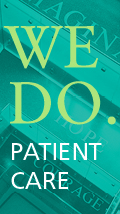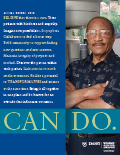Survivorship begins the day of diagnosis
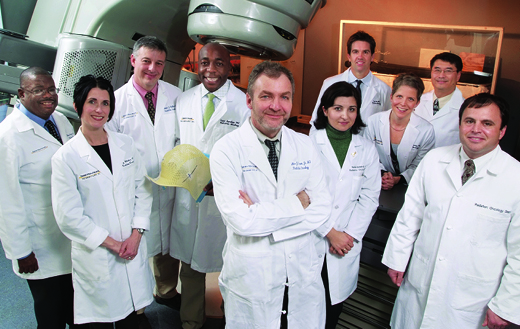
Winship clinicians cared for more than 5,000 newly diagnosed patients last year, bringing to the task a multidisciplinary cadre of clinicians, social workers, nutritionists, and researchers at the front line of discovery, all working together to improve the outcome for each individual patient.
|
Turning down the anxiety of cancer Turning up the science of survivorship |
Nearly 80 percent of the top cancer doctors in Atlanta Magazine’s ranking for 2010 were from Winship, and stellar health professionals from around the world continued to join Winship’s teams in radiation oncology, surgical oncology, hematology, medical oncology, diagnostic imaging, and complementary therapies.
Designation as a National Cancer Institute center markedly increased therapeutic options for patients at Winship – and for the community doctors with whom Winship collaborates, helping fulfill Robert W. Woodruff’s dream that Georgians never have to leave the state for the most advanced care possible.
Turning down the anxiety of cancer
“It’s cancer.” The words themselves can be emotionally overwhelming, the complex treatment logistically daunting. Two new Winship programs are helping change that. Caring, well-trained allies guide patients, one-on-one, on every step of the journey, from diagnosis through treatment.
The treatment maze is a lot easier to navigate with a knowledgeable advocate by one’s side. Nurse navigators meet patients during clinic visits, sometimes accompanying them into the exam room to lend support and make sure they understand the treatment plan. They help coordinate appointments, assist with prescription refills, connect patients to help with paperwork and locate local physicians to collaborate with the Winship team for out-of-town patients. A nurse navigator is the go-to person for questions about what a pathology report means, whether the medical story in today’s paper has anything to do with the patient’s own cancer, or the long-term effects of treatment. Nurse navigators do whatever is needed to make cancer care go as smoothly as possible for patients and families. For example, when a dentist hesitated to perform a scheduled root canal after learning his patient was receiving chemotherapy, one call to the patient’s nurse navigator resolved the issue without her having to get out of the dental chair.
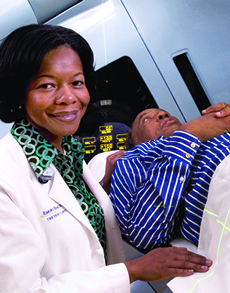
Karen Godette, MD, combines compassion with today’s most advanced radiation therapy. |
Only someone who’s been there and back can really understand what it means to have cancer, so in 2010 Winship created a Peer Partners Program that matches recently diagnosed cancer patients with cancer survivors. Survivors share their own experiences, from response to chemotherapy and other clinical procedures to the emotional roller coaster they and their families sometimes rode. Spending time with someone who’s been there makes the patient’s own journey seem a little less foreign and a lot less lonely. I did it; you can too. Peer Partners listen, helping patients find answers to the questions that concern them, some that might feel too personal for even the support groups also offered by Winship. An ongoing relationship with a survivor provides a special kind of social support shown in numerous studies to be associated with better clinical outcomes. Because of its innovative structure and the unique training and materials provided volunteers, Winship’s Peer Partner program is rapidly becoming a model for other cancer centers across the country.
Turning up the science of survivorship
Winship offers Georgians more prevention, diagnosis and treatment options than ever, including access to cutting edge therapies not available elsewhere. In the most active cancer clinical research program in the state, Winship clinicians and scientists currently are conducting more than 150 therapeutic trials of new ways to treat and beat cancer, such as image-guided radiosurgery for painful metastasis to the spine; new techniques to more effectively detect the prostate cancers that come back in almost a third of patients; and more powerful treatments for patients with recurrent, drug resistant ovarian cancer. Such clinical research is vital to discover and hone the medicine of the future. It also can change outcomes for today’s patients.
|
Winship offers Georgians more prevention, diagnosis and treatment options than ever, including access to cutting edge therapies not available elsewhere. In the most active cancer clinical research program in the state, Winship clinicians and scientists currently are conducting more than 150 therapeutic trials of new ways to treat and beat cancer. |
Some examples:
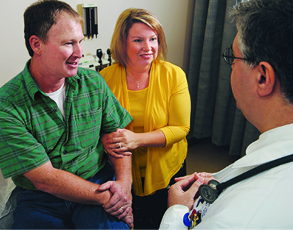
Fadlo Khuri, MD, Chair of Hematology and Medical Oncology, blends science with compassion when working with his patients. |
Winship is leading a national study for patients with mutations in BRCA1 or BRCA2 genes who have breast, pancreas, colon, ovarian, or any other types of cancer. Study participants continue to undergo standard treatments for their specific cancer, but some also take a drug called ABT-888 (valiparib), which inhibits an enzyme that helps cancer cells repair DNA damage. Scientists believe slowing down the repair enzyme may make these particularly hard-to-treat tumors more responsive to commonly used cancer drugs like carboplatin and paclitaxel.
Lung cancer is the leading cause of cancer death in both men and women, and Winship – whose multi-specialty lung cancer specialists care for over 700 new lung cancer patients every year – is among a small group of elite cancer centers attacking the disease on several fronts. In one ongoing clinical trial for patients with non-small cell lung cancer, one of the most challenging forms of the disease, the drug crizotinib targets the switch that allows cancer cells to multiply and spread to other parts of the body, causing tumors to shrink or stabilize.
Another study found that adding the drug vorinostat to standard drugs almost tripled response rates in metastatic non-small cell lung cancer. Winship also is one of a handful of cancer facilities participating in a national effort to “fingerprint” genetic changes or mutations in lung cancers in order to personalize treatment of patients with new drugs that target specific mutations.
For most women with HER2-positive breast cancers, Herceptin has been a silver bullet of a drug, targeting cancer cells while sparing healthy ones. However, almost 10 percent of these women are resistant to Herceptin at diagnosis and almost all metastatic HER2-positive breast cancers eventually become resistant. A recent clinical trial at Winship found that adding Taxol and RAD001 (Afinitor) to Herceptin caused the cancer to either stop growing or to shrink in almost 80 percent of Herceptin-resistant cases. A phase III trial is now under way, suggesting the new treatment may soon enter general practice.
Multiple myeloma, a cancer of blood cells, remains incurable, although chemotherapy can stave off the disease for a while. Now, an Emory-led clinical trial offers hope to patients who have experienced one or more relapses. When combined with standard drugs used to treat multiple myeloma, elotuzumab, an antibody engineered to attack a protein found abundantly on the surface of multiple myeloma cells, produced a positive response in 83 percent of all patients and in 95 percent of those who had not previously been exposed to the standard drug.
|
With assistance from survivors themselves, Winship took new steps this year to develop a formal survivorship program designed to help make every step of the survivorship path easier. |
Staying in the Winship family as a survivor
Having cancer changes you, say many survivors. In addition to offering numerous support groups, Winship has developed a Survivorship Program for every patient.
Thanks to efforts of physicians, nurses, staff and survivors such as Ned Crystal and Denise Miller, Winship has developed a multifaceted survivorship program.
Turning off depression post cancer treatment. Surgery, chemotherapy, radiation, even psychological stress, all activate the immune system, leading to the release of cytokine molecules that can change the chemistry and circuitry of the brain, resulting in depression, fatigue, and impaired memory and concentration. For most patients, these changes switch off when treatment ends. Some, however, continue to suffer debilitating problems even after their cancer is cured. In the first U.S. clinical trial of its kind, Winship doctors are using the cytokine blocker Infliximab to block the release of cytokines, offering new hope to former cancer patients whose depression has failed to respond to other treatments.
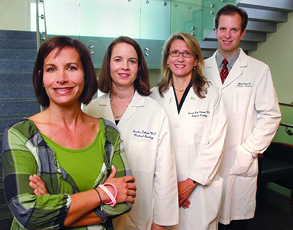
For the past three years, survivor Kristen Moss has been volunteering for Winship in a variety of ways. |
Growing up with Winship. Although Winship focuses on adult patients, its partnership with the Emory-Children’s Center and Children’s Healthcare of Atlanta assures that pediatric cancer survivors always have an appropriate medical home, no matter what their age. As survivors of childhood cancer move into adulthood – as the majority now do, thanks to research – they are able to move seamlessly from a pediatric to a Winship oncologist and other physicians for follow-up.
That appears increasingly important. Pediatric oncologist Lillian Meacham and her colleagues recently found that former pediatric cancer patients in their 40s and 50s, even their 30s, are more likely to have high blood pressure, elevated lipids, and diabetes, making them 10 times more susceptible to heart attack than their peers. “Our goal in cancer survivor work,” says Meacham, medical director of the Cancer Survivor Program at Aflac Cancer Center at Children’s, “is to prevent long-term consequences of the cancer or its therapy or to detect them as early as possible and intervene.” Meacham also is working to change national guidelines to include earlier, more active screening of pediatric and adult cancer survivors for cardio-vascular risk.
Increasing patient satisfaction, one patient at a time
This past year, Winship also created a Patient and Family Advisory Committee, designed to provide input and counsel from people who know Winship’s programs from the patient perspective. The committee advises Winship leaders on a variety of issues, from patient education materials, to improving seating arrangements in waiting areas. Their real-world, real-time feedback on programs and processes is essential for the constant improvement for which Winship strives.


